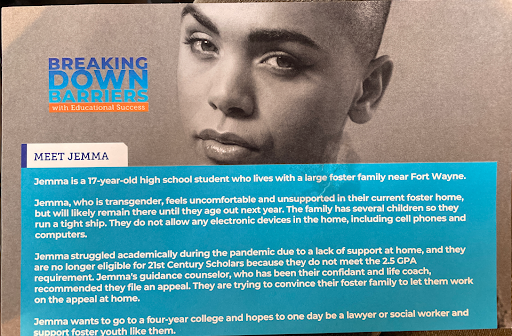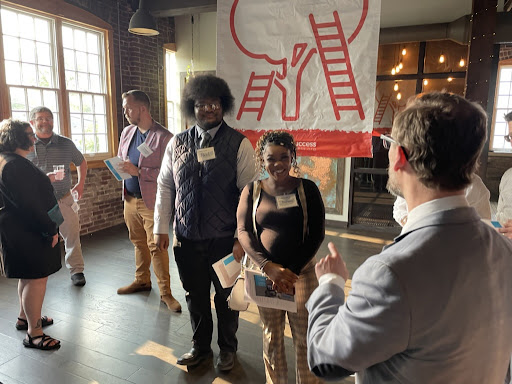I was invited by a friend to a fundraiser for Foster Success, an organization I had never heard about while I was a classroom teacher and administrator. I wish I had because this impressive organization is filling a much needed gap in an increasingly complex world where adolescents headed towards adulthood have to contend with extraordinary challenges spanning categories and domains their classmates and peers do not. This became readily apparent at the event as the staff introduced attendees to recipients of their programming and services. These young adults shared from their own unique experience entering the foster care system and where they were coming up short in key areas that Foster Success was able to cover with their expertise and resources. Multiple stations with a different thematic focal point allowed the graduates to share their testimonies aligned with diverse composite personas detailed on a printed handout, like the one I received below:

Foster Success’s fundraiser event handout, a composite persona of a type of student they support.
As we made our way through each station, we met other Foster Success graduates who would ask us how we’d feel if we were in such a situation as each of the composite personas. The graduates-turned-ambassadors were amazing spokespeople for the organization and compelling advocates helping attendees recognize how important it is to support foster care children beyond the basics.

Two Foster Success graduates leading discussions around the five impact areas.
Even a generation removed, the event made me realize how much I didn’t know I was taking for granted during my high school years. Categories like academic support, financial literacy, postsecondary planning, physical and mental health—thousands of decisions and tasks that parents typically shepherd their children through longitudinally. This guidance gets fractured for youth in the foster care system, leading to students who miss out on opportunities and fall behind academically, putting them at risk for success once they reach adulthood and age out of the system. The risks are real for these young people, with way too many experiencing threats such as homelessness and all that can come with a life of early impoverishment. Foster care staff, teachers, and school counselors know this implicitly, yet no matter how much they can advocate for these students, they cannot realistically cover all the gaps nor do so long enough to ensure each of those children are successful in all categories.
“This guidance gets fractured for youth in the foster care system, leading to students who miss out on opportunities and fall behind academically, putting them at risk for success once they reach adulthood and age out of the system.”
That’s where Foster Success is such a valuable asset to our communities. Since 2012, the non-profit has provided mentoring, programming, and financial aid to young people nearing the end of their time in the foster care system, supporting their final chapters of formal schooling (and the holistic needs of childhood in general), and into their young adult aspirations from postsecondary plans and beyond. In 2021-22, the organization distributed over $2.8 million to over 800 participants, ensuring their transition out of the foster care system has a chance to succeed in across their diverse array of programs within five impact areas:

The programs for each area are robust and continuously improving, all the while partner agencies have been helping to alleviate the burden on the foster care system itself. Indiana has more children in foster care than any of the surrounding states. And while foster placements have been on the decline with recent state-led efforts, advocacy experts are concerned for the nature of how certain young people are placed in the system because of racial disparities reflected in the data, showing that 18% of youth in foster care are Black relative to an 11% representation in Indiana’s population for Black minors. This is clearly an equity issue and thus, continued support is necessary to not only prevent children from entering the system, but to ensure future generations don’t further contribute to these dire statistics, which is why the organization’s leaders have an eye towards extending services into a participant’s mid-twenties. Their six-week Catalyst program is an active example aligned with this need.
“Indiana educators working with students in the foster care system have such a valuable resource in this organization, to ensure all children are surrounded by the opportunities Foster Success affords.”
Foster Success’s leadership would love to see even more young people receive the benefits of their program offerings and are looking to equip school counselors to support this specific cohort of students. Likewise, a more inclusive school culture for students in foster care and their guardians would be a mutual benefit with impact on communities writ large. Their work is noble and that is an understatement. Indiana educators working with students in the foster care system have such a valuable resource in this organization, to ensure all children are surrounded by the opportunities Foster Success affords.
For more information, review their Impact Report and Strategic Plan and get involved!
Resources
Please login or register to claim PGPs.
Alternatively, you may use the PGP Request Form if you prefer to not register an account.


